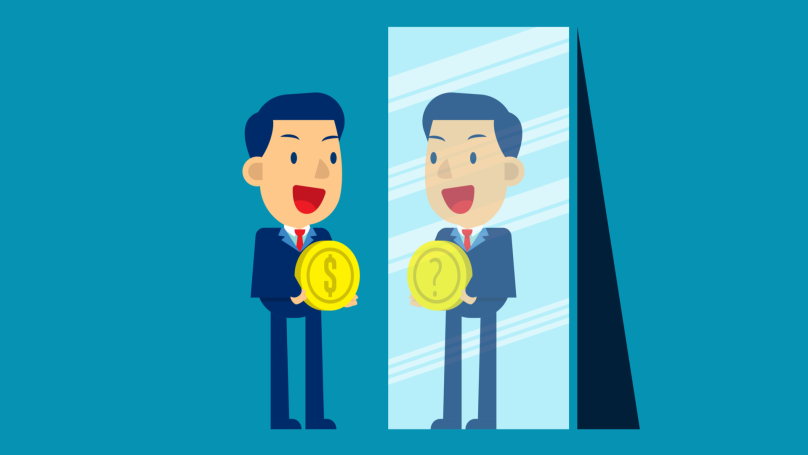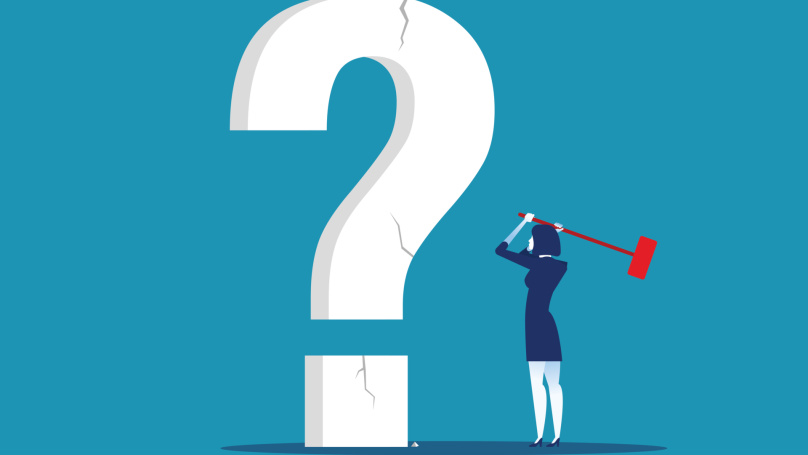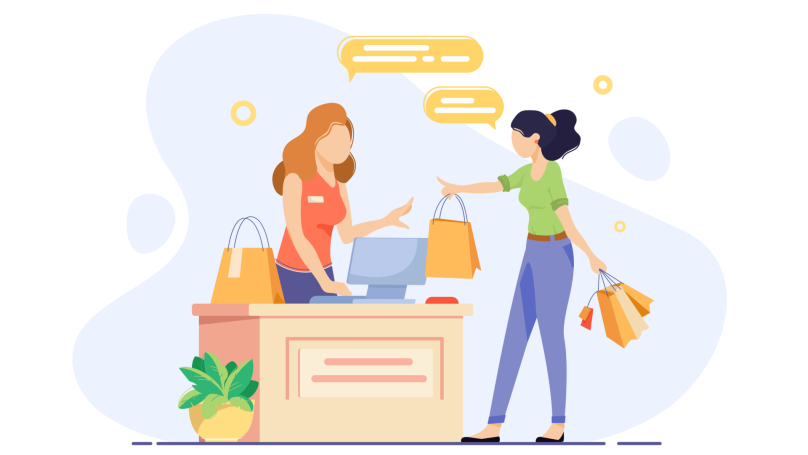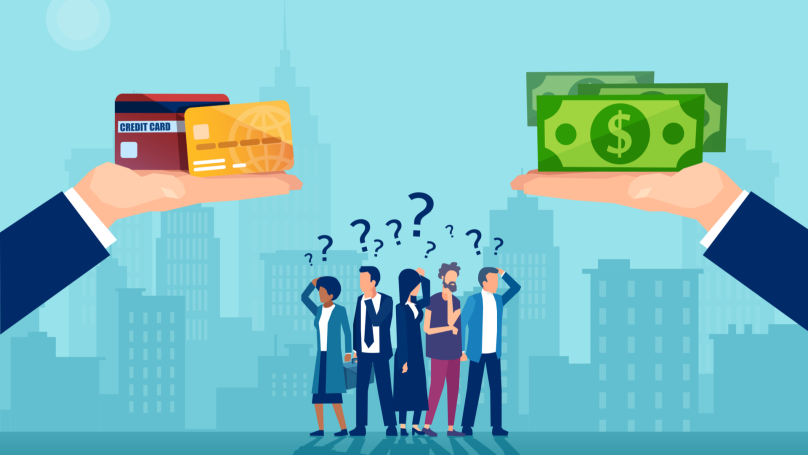Perfect Sales: How to Ask the Right Questions to the Customer
A good sales manager is both a marketer and a psychologist rolled into one. They should be a versatile fighter who knows how to establish contact with the potential customer, identify their needs, present the product in a good light, and direct the conversation towards closing the deal.

Contents:
- The main stages of sales
- Types of questions for a quick sale
- Taboo questions: precisely what NOT to ask!
All this is possible with versatile sales skills. An essential part of this, which should never be underestimated, is the ability to ask effective questions.
With sales skills, you will always be employable and in demand. That's because good salespeople are worth their weight in gold to any company. Additionally, sales can open the door to starting your own business and allow you the freedom of striking out on your own and becoming self-employed. Also, sales surround us in everyday life, literally everywhere. After all, what is a date or interview with an employer, if you aren't selling yourself as the best of the best?
The main stages of sales
To become a top-notch salesperson, you need to understand how the sales process works. It has five main and sequential stages:
- Breaking the ice - establishing contact. The getting acquainted stage is when you should make the best possible first impression on the potential client. It requires all the requisite components of excellent communication skills: a smile, a friendly tone of voice, personal charm, charisma and, of course, expertise in the issues that a potential client contacted your company for in the first place.
- Identifying the needs of the client. The second stage organically flows from the first. An effective salesperson should identify the client's problems in the first five minutes of communication. At this point, the ability to ask the right questions and the ability to listen are more vital than ever. The customer should express their position and preferences, and the seller should choose the best way to satisfy their requests. That is one of the most crucial stages of the negotiations. Wrongly identified needs would ruin all further attempts to close a deal.
- Presentation of the product or service. This stage involves more practical information than others. Present this information in a succinct and timely manner. Since we live in the era of the Internet and social media, in which the customer can find key characteristics about the product without your help, it is imperative to emphasise your presentation, and not get into details. This stage is consequently followed by returning to the client's questions. But now you are not asking questions but answering them.
- Tackling objections. This stage is inevitable, and it is by no means to be feared. Objections are a signal that the customer is seriously considering buying. The salesperson should remember that if they manage to bat away all the potential customer's objection, this will automatically seal the deal. Nevertheless, closing objections is an art form that requires persuasion, listening and even public speaking skills.
- Conclusion of the transaction. The final stage is where the salesperson must receive payment, draw up the contract, and fulfil all their duties and do their utmost to ensure that the client becomes a regular customer. Excellent customer care and after-sales service are imperative in achieving this.

Types of questions for a quick sale
There are several types of questions that a salesperson can ask a customer to identify their needs during a conversation.
Closed questions
These are questions with binary answer options. Like in a school test, the possible replies are either "Yes," or "No." These questions are right for warming up and getting to know the customer and those situations where the choice is only between two versions of the product. Nevertheless, a word to the wise: don't over-egg the pudding when using closed questions. You can easily make a mistake, several "No" replies in a row from your potential customer provides an opportunity for them to end the conversation and find a more insightful seller instead. Therefore, try only to use closed questions when you can get the answer you want.
Leading questions
These are questions-statements that end with the words like "right?" and "do you agree with this?" A specific proposal always follows this question. That is why you should ask leading questions at the end of the identification of the need stage or the stage of closing objections. As a result, it entails the necessary response, in which the client can either agree or disagree. The first option is, of course, is preferable. The purpose of this question is to get the customer's approval and create a favourable atmosphere for further sales. Bear in mind though that the frequent use of this type of question irritates the interlocutors.
Clarifying questions
These questions are useful for establishing contact at the initial stage where you are getting acquainted, and are phrased by the algorithm "Did I correctly understand that...", "Do you mean, you need to..?"
Specific questions
Such questions imply the exact answer from the client. The seller needs them to narrow the range and understand the buyer's expectations. The answer to these questions is often facts or figures. For example, if a salesperson asks, "How often do you use this product?" or "How many pieces do you need?".
Alternative questions
These questions are also similar to school tests, but with multiple choice answers. For example, "Are you interested in this or that?"Or, "Do you like red or blue more?" The customer still answers in monosyllabically, as in the case of wholly closed questions. Nevertheless, in this case, the seller gets the opportunity to quickly identify the problem and motivate the customer to buy - "Do you pack the goods or not?" These questions are essential in the final stages of selling as a trigger.
Important! You should not offer more than two alternatives because otherwise, the person may get confused.
Open-ended questions
The customer cannot answer open-ended questions with a simple "Yes" or "No", and therefore begins to talk about their needs and problems. The main thing is not to rush with these questions, and they should be asked at least after the closed ones! Otherwise, the client may become confused or even afraid to declare their intentions so openly. When asking open-ended questions, the salesperson should listen more than talk. There is no doubt that this type of question is a must-have for any deal! They successfully help to get the client talking. In the course "The Perfect Sales System: Techniques for closing any deal", we explore the questions asking which will help you the most to get the customer talking.
Lectera’s Online Courses by topic

How do you get the potential customer to start talking?
If the client talks about themselves, their needs, or the process of closing the transaction at least 30% of the time, then the odds of successfully closing the deal increase significantly. The last type of questions that helps to get the client to talk - open-ended questions. There are also some universal tips for this:
Don't interpret the answers yourself
Avoid judging the client's response from the first phrases, and give the customer time to explain themselves. Imagine that you are an interviewer, not a salesperson. You only have to collect and analyse information and not predict or influence further answers. Your task in communication is to learn as much as possible about the client, without rating or interrupting them.
Structure your questions
Think through the sequence of questions - from general and warming up the customer to more focussed, narrowed to selling. That will make it easier for the customer to organise their speech, and they will be able to open up to you faster. For example, the sequence might be:
- "What was your biggest purchase in the last year?"
- "What problems led you to that purchase? Have you solved them? "
- "Are you looking for something similar now?"

Please don't turn it into an interrogation
Communication must be natural. Remember, you're a salesperson, not a chatbot! Your task is not just to amass as much information as possible, but also to win a person over. Imagine that you are on a date. You simultaneously want to tickle the interest of the customer and learn more about them. However, you don't want to be too pushy and scare them and make the potential customer run away. That is why you should not ask all of your questions at once: ease them with jokes, your opinion between questions, informal remarks. The secret is to help the client relax.
A few more golden rules of questions
- Always start with the question words such as: "How?" "Why?" Or "What?"
- Include a narrative phrase or sentence in the question that suggests a good yarn. For example: "Tell me about..."
- Pause between questions and give the client time to think. Someone needs more of this time, and someone less, depending on the character's type and nature.
- Never start the question "Have you tried...?" because according to the research, this is the most annoying type of question you can ask a customer!
Taboo questions: precisely what NOT to ask!
- How much are you willing to spend?
The honest answer of every potential customer will be "As little as possible." Nevertheless, no one would say that out loud. If a customer comes to your store, it means that they already have the requisite amount of money, and everything else is trivial. Choose several options-from the cheapest to the most expensive. After all, the main thing is not to sell the most expensive items in the store, but to solve the customer's pain. If an averagely priced product can solve the problem, then offer it. The client will appreciate this and will certainly come back to you again.
- What is your problem?
Not everyone realises what their problem is. If you ask the client directly about this, their opinion on this matter may lead you up the garden path and barking up the wrong tree. Consequently, you must dig deeper and find the root causes, not the consequences, which are usually what customers focus upon. For instance, if a customer says, "If I don't learn how to pass interviews, I won't get this position that I've been dreaming about for so long." However, their problem is not about any specific position they are dreaming of, but because the client lacks a particular skill for self-confidence and success in the labour market.
- Can you tell us more about yourself?
The construction "You can tell..." is acceptable and even effective if used opportunely, but such a question sounds too broad. As in the case of launching into a tirade of open questions on the customer from the get-go of the first minute of acquaintance, they will become confused if you ask them to tell you about themselves. If you hope to use this question to skip all the sales stages and avoid numerous types of questions - it won't work. The steps discussed above are mandatory and help to discover the client, establish trust and understanding. An ordinary story about yourself (even if a person agrees to it) will not replace a full-fledged process.

Asking the right questions is the key to gaining a customer's trust, needs, and consent. By selecting them, formulating them, and asking them when required, you can easily find the client's pain points and successfully solve their problems. Each type of question has its characteristics and its own time to be voiced.
Want to learn more about the types, and what questions will be useful for each of the sales stages? Do you want to learn what else you can do to get the client to talk and eliminate their distrust? And do you want to know how to direct questions to close down any customer objections and close the conversation to make a sale successfully? Take the Lectera course "The Perfect Sales System: Techniques for closing any deal." In just eight lessons, you will learn what mistakes are most often made by non-professional sellers, how to keep a positive attitude in communicating with the client, make the best first impression, and choose the right individual approach for every unique buyer.
Share this with your friends via:
Latest News

A significant stage in the development of the alternative education system has begun in West Northamptonshire in the UK: the County Council is actively calling on parents, guardians, and trustees to participate in shaping the future of this key area.

Outwoods Primary School in Atherstone, Warwickshire, having experienced deep sadness after the loss of their famous cat, Silla, has found solace in a new pet – a Maine Coon named Aloysius O’Hara.

In modern universities, artificial intelligence, and in particular ChatGPT, is rapidly transforming from a controversial tool into a full-fledged student assistant.

An innovative educational project is gaining momentum in UK primary schools, aiming to change attitudes towards video games.

The Massachusetts Institute of Technology (MIT) presents MIT Learn – a revolutionary online platform that opens a “new front door” to access university knowledge and resources.












 Test. Check Your Social Media Dependency Level!
Test. Check Your Social Media Dependency Level!
 Test: What Business is Right For You?
Test: What Business is Right For You?
 “I’m Here for the Long Haul”: When Loyalty to a Company Becomes Toxic
“I’m Here for the Long Haul”: When Loyalty to a Company Becomes Toxic
 Test: How Prone Are You to Abusive Behavior as a Manager?
Test: How Prone Are You to Abusive Behavior as a Manager?
 Test. What superpower would you possess if you were a superhero?
Test. What superpower would you possess if you were a superhero?
 Test. What Should You Let Go of Before Winter Ends?
Test. What Should You Let Go of Before Winter Ends?
